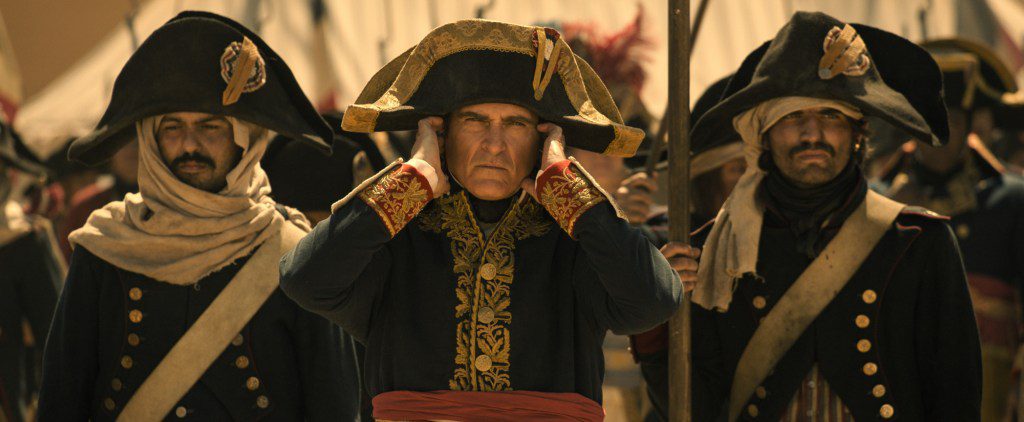[ad_1]

There are ghosts on and off the display in Ridley Scott’s twenty eighth function, chief amongst them being Stanley Kubrick’s unrealized biopic of Napoleon Bonaparte, the Corsican navy strategist who inveigled his means up via the ranks of the navy to turn into the chief of France not as soon as however twice. That on the age of practically 86 Scott has stepped as much as end what Kubrick couldn’t is one thing the British director will little question relish. However although his tackle the story is his personal, there’s nonetheless one thing elusive about Bonaparte’s story that doesn’t make a coherent complete: as is in keeping with historical past, Scott’s Napoleon is a lover and a fighter, an incongruity that results in sharp modifications in tone and a restlessly episodic narrative that may be overwhelming in its dates, names and locations.
For Napoleon to work in any respect, it wants an imposing however charismatic presence, somebody like Marlon Brando, who performed Bonaparte within the unusual 1954 historic romance Desirée. Kubrick had wished Jack Nicholson, and Joaquin Phoenix doesn’t fall removed from that tree. His casting actually units the tone, and Scott doesn’t waste any time in laying out his stall: this can be an old-school epic, within the vein of Anthony Mann’s The Fall of the Roman Empire, and there’s actually a visceral pleasure from seeing Scott, a grasp craftsman, placing each greenback, and extra, on the display.
These films, nonetheless, normally went for blockbuster casting, and — although it serves the story, being the story of a person who effortlessly outclassed his friends — Napoleon usually feels prefer it’s lacking a star flip or two, a nagging suspicion that’s confirmed when Rupert Everett turns up within the ultimate 40 minutes, because the wily Duke of Wellington, and Bonaparte lastly meets his match.
Scott has stated that Kubrick’s remedy didn’t curiosity him as a result of it spanned “beginning to demise,” however David Scarpa’s script shouldn’t be 1,000,000 miles away from that, tracing Bonaparte’s ascension to his demise, which is 28 years out of 51. A written prologue units the opening scenes in revolutionary France, noting that “individuals are pushed by distress to revolution” and vice-versa, as we see the agonizing decapitation of Marie Antoinette. The general public is delighted, however behind the scenes, the French authorities is in disaster. To spice up morale, Bonaparte gives his providers to regime chief Paul Barras (Tahar Rahim), devising an ingenious guerilla assault on a British fortress in Toulon.
His plan is successful, and Scott paints it in all its bloody glory, culminating within the spectacular cannon-fire destruction on British ships with pictures which are as brutal and fast as CNN and but touched with the artistry of Canaletto (the ethics of this — deploying aesthetics in depictions of conflict — are open to debate, however Scott has handle to skirt that situation for years now). Inside these explosive 20 minutes, the movie is off the beginning blocks, establishing Bonaparte as a person with a thirst for fight and a fearless warrior who who has no qualms about main from the entrance. How can it probably sustain the tempo for the following 2 hours 40?
Unsurprisingly, it may well’t; the rise of Napoleon Bonaparte is so interlinked with the maze of forms that adopted The Reign of Terror — the intrigue and counter-intrigue — that Scott instantly pivots to Bonaparte’s first encounter with Joséphine de Beauharnais (Vanessa Kirby). Joséphine catches him looking at her at a society ball and instantly confronts him. Bonaparte is in all his navy finery, however Joséphine is withering. “What is that this costume you’ve gotten on?” she asks. “It’s my uniform,” he says, a humorous little second that exhibits how small he turns into in her presence. He ends the scene by begging her: “Don’t inform me your identify.” However he finds out anyway, when she sends her younger son to retrieve his late father’s saber.
Joséphine is a dichotomy that fascinates Bonaparte. “While you take a look at me, do you see an aristocrat?” she wonders, earlier than telling him that, whereas imprisoned in the course of the Terror, she used her physique to outlive. Regardless of these “indiscretions,” Bonaparte ploughs on with the connection; unaware that she has taken a lover behind his again, he writes intense, impassioned letters as he begins his onslaught the world over. When his thoughts must be on the job, it’s firmly elsewhere (“My achievements appear slight, as they preserve us aside,” he says). And in a refined foreshadowing of how issues are about to pan out, he notes, “This love I’ve for you is a sort of demise.”
Clearly, then, there are two very totally different tales intertwining right here, and, for a time, they don’t fairly meet within the center. Kirby struggles with a task that has a lot psychological weight — their “love” is best described as a poisonous, S&M-style co-dependency — however more and more much less display time, as Bonaparte turns into obsessive about producing a male inheritor underneath the watchful eye of his mom. It’s maybe to be anticipated, then, that Scott pulls out all of the stops for the fight scenes, topping the fiery siege of Toulon with the icy battle of Austerlitz and, lastly, the second that Bonaparte actually met his Waterloo, in beautiful and presumably faithfully rendered battle scenes that gun for Akira Kurosawa’s Ran.
Simply because it capped Bonaparte’s story, Waterloo brings issues to a satisfying conclusion, largely because of Everett’s portrayal of Wellington. Scott even brings a contact of self-deprecating British humor to the fore right here (“I by no means get moist if I may also help it,” says Wellington, mounting his horse on the final minute), and the director permits Britain to have a good time its victory with no strings connected — which exhibits quite a lot of good grace, given the disastrous efficiency by British politicians within the final seven years.
The runtime doesn’t precisely fly by, and one shudders to assume how a Director’s Minimize with two extra hours will assist that, however Napoleon, like its topic, will get the place it’s going by stealth. What takes some getting used to is that the true film is occurring in Bonaparte’s thoughts; he’s inured to the truth that his friends assume he’s a thug, that he has held the world hostage, that he’ll battle to attain peace by any means vital, and, whereas doing it, he’s dismissive of virtually everybody he meets (“It’s such a disgrace that such an incredible man shouldn’t have any manners,” sniffs a British envoy). It’s onerous to think about an actor that would pull this off and make it so participating, however Phoenix does, an achievement made particularly spectacular while you notice that this self-styled grasp of conflict despatched over 3 million males to their deaths in simply 22 years.
Title: Napoleon
Distributor: Sony Footage
Launch date: November 22, 2023
Director: Ridley Scott
Screenwriter: David Scarpa
Forged: Joaquin Phoenix, Vanessa Kirby, Ludivine Sagnier, Rupert Everett, Tahar Rahim
Ranking: R
Operating time: 2 hr 38 min
[ad_2]
Source_link





